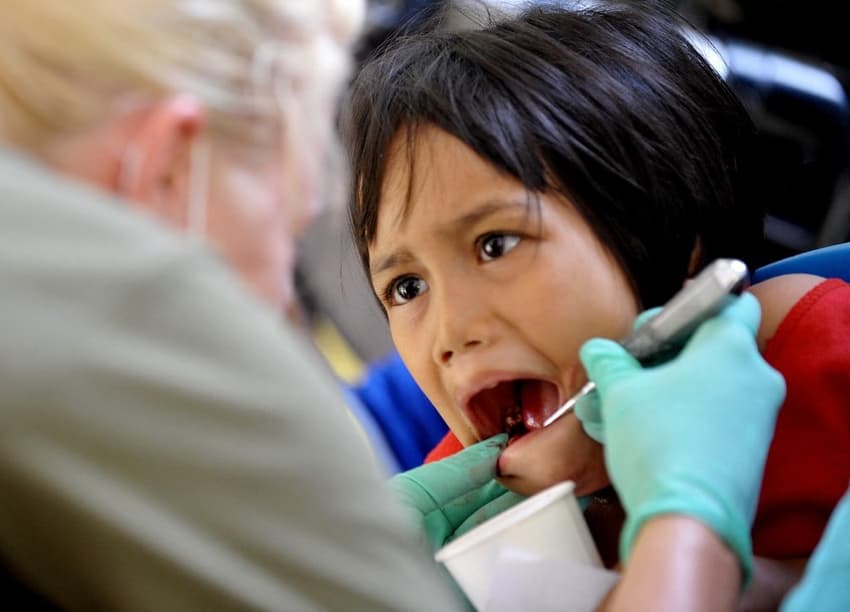Spain to offer free dental care to children

The Spanish government is set to approve a measure which will offer children aged 0 to 14 and other population groups free preventative dental care through the country’s public healthcare system.
The Spanish cabinet on Tuesday looks set to allocate €44 million to its new Oral Health Plan, which aims to give free dental care to young children, pregnant women, people with mental disabilities or upper limb physical disabilities as well as people with head and neck cancers.
Although Spain’s public health system is regarded as one of the best in the world, it generally does not cover dental treatment, meaning most Spaniards have to pay a private dentist to get a check-up or receive any dental treatment.
Some regions offer more than others. For example, when it comes to young children, Madrid covers the cost of fillings in 6 to 15 year olds, Andalusia pays for check-ups for children aged 6 to 15, and Catalonia and the Valencia region both offer free preventative treatment to those aged 0 to 14.
What Spain’s new Oral Health Plan would do is “homogenise” this public dental cover for children and other population groups deemed vulnerable across all of the country’s 17 regions and two autonomous cities.
But according to Health Minister Carolina Darias, children aged 0 to 14 will be the primary beneficiaries of this legislation, as they number above 6.5 million in Spain and the plans include regular check-ups, cavity analysis, minor interventions and more.
The future measure, which will still require parliamentary approval in the coming weeks before it can come into force, will also prevent the introduction of more co-payments for non-urgent medical transport or therapeutic dietary and ortho-prosthetic products.
It will not cover the cost of cosmetic treatment such as braces or teeth whitening.
Pregnant women have been included in the plan given that bleeding increases during pregnancy due to heightened circulation, as well as the fact that calcium levels decrease.
The overall focus of the legislation is on preventative dental care as in the words of the health minister "most" diseases related to oral health, such as cardiovascular disease, diabetes, cancer or obesity "can be prevented and treated in the early stages".
The draft law also includes a clause stating that these free healthcare schemes cannot be managed by private companies, as is currently the case.
The €44 million in free dental care funds will be taken from the €70 billion allocated by the EU as part of the bloc’s post-pandemic recovery plans.
Comments
See Also
The Spanish cabinet on Tuesday looks set to allocate €44 million to its new Oral Health Plan, which aims to give free dental care to young children, pregnant women, people with mental disabilities or upper limb physical disabilities as well as people with head and neck cancers.
Although Spain’s public health system is regarded as one of the best in the world, it generally does not cover dental treatment, meaning most Spaniards have to pay a private dentist to get a check-up or receive any dental treatment.
Some regions offer more than others. For example, when it comes to young children, Madrid covers the cost of fillings in 6 to 15 year olds, Andalusia pays for check-ups for children aged 6 to 15, and Catalonia and the Valencia region both offer free preventative treatment to those aged 0 to 14.
What Spain’s new Oral Health Plan would do is “homogenise” this public dental cover for children and other population groups deemed vulnerable across all of the country’s 17 regions and two autonomous cities.
But according to Health Minister Carolina Darias, children aged 0 to 14 will be the primary beneficiaries of this legislation, as they number above 6.5 million in Spain and the plans include regular check-ups, cavity analysis, minor interventions and more.
The future measure, which will still require parliamentary approval in the coming weeks before it can come into force, will also prevent the introduction of more co-payments for non-urgent medical transport or therapeutic dietary and ortho-prosthetic products.
It will not cover the cost of cosmetic treatment such as braces or teeth whitening.
Pregnant women have been included in the plan given that bleeding increases during pregnancy due to heightened circulation, as well as the fact that calcium levels decrease.
The overall focus of the legislation is on preventative dental care as in the words of the health minister "most" diseases related to oral health, such as cardiovascular disease, diabetes, cancer or obesity "can be prevented and treated in the early stages".
The draft law also includes a clause stating that these free healthcare schemes cannot be managed by private companies, as is currently the case.
The €44 million in free dental care funds will be taken from the €70 billion allocated by the EU as part of the bloc’s post-pandemic recovery plans.
Join the conversation in our comments section below. Share your own views and experience and if you have a question or suggestion for our journalists then email us at [email protected].
Please keep comments civil, constructive and on topic – and make sure to read our terms of use before getting involved.
Please log in here to leave a comment.